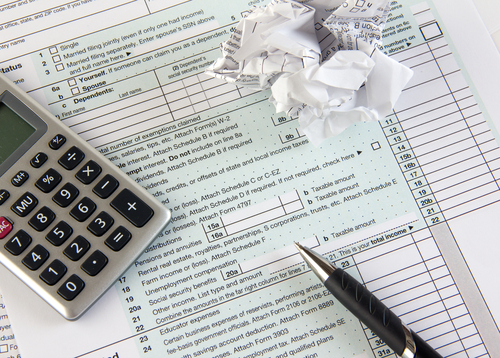
Owning rental property can be a lucrative investment, but only if managed effectively. As the rental industry grows, more investors are looking to this sector for passive income opportunities. However, with reward comes a certain amount of risk. While valuable tips for new landlords are everywhere, a crucial part of success is understanding what not to do. So, join us below as we reveal the common landlord mistakes that can kill the profit margin on rental properties.
10 Mistakes that Kill Profit Margin on Rental Properties
Anyone can become a rental property landlord. However, savvy investors know that success in the rental industry involves juggling legal obligations, tenant requests, and property needs. Moreover, failing to manage effectively can result in a diminished profit margin on rental properties. Therefore, check out this list of common mistakes to avoid as a landlord below.
- Failing to Prioritize Tenant Screening
- Skipping the Security Deposit
- Not Getting a Lease
- Picking a Bad Rental Location
- Neglecting Essential Maintenance
- Overspending on Improvements that Do Not Provide Good ROI
- Failing to do Regular Inspections
- Missing Out on Tax Credits
- Not Having the Right Insurance
- Failing to See the Benefits of Professional Management
Failing to Prioritize Tenant Screening
One of the most prominent landlord mistakes is failing to thoroughly screen potential tenants. As a result, owners face a higher likelihood of late payments, lease breaks, or excess damage by not vetting all applicants. New landlords may believe that skipping the screening process in an effort to fill the unit faster is best. However, this is not the case! In fact, moving in an unqualified tenant can lead to added expenses or lost income which cut into overall profit.
So, to avoid hindering profit margin on rental properties, carefully screen each applicant in compliance with applicable Fair Housing Laws. In general, to qualify an applicant, landlords should verify the following –
- Income and Employment History
- Creditworthiness
- Criminal Background
- Prior Landlord References
Skipping the Security Deposit
A security deposit is a set amount of money collected before a tenant takes occupancy of a rental. These funds serve as protection for owners against unexpected lease breaks, unpaid rent, or excessive tenant damage. That said, collecting a security deposit is a vital part of the rental process that some landlords skip over.
While many tenants may appreciate not paying a deposit, this is a colossal mistake for landlords. In fact, security deposits are just as vital as the monthly rent itself. Not charging enough or worse, none at all means rental owners may be left covering expenses or pursuing costly litigation. So, be sure to include a required deposit in your next lease that fits the property needs while complying with all applicable laws.
Not Getting a Lease
There are a few different lease contracts for rentals, including short and long term-residential, commercial, or monthly. Additionally, the rental agreement is the most crucial document in the landlord-tenant relationship. So, not utilizing a legal and signed lease can quickly kill the profit margin on rental properties. These documents contain all essential information that lays out each party’s roles and responsibilities. Furthermore, the lease lists consequences that allow landlords to take action if the tenant defaults, causes damage, or violates the lease terms.
Therefore, the landlord has little recourse against an unruly or non-paying tenant without a good lease in place. Thus, leaving owners holding the bill if something goes wrong.
Picking a Bad Rental Location
Location is one of the most important factors when choosing an area to invest in. That said, it takes time to evaluate potential sites and opportunities carefully. Unfortunately, a common landlord mistake is to rush through this critical due diligence process. Ideally, investors should seek out neighborhoods with a healthy population and economic growth. In addition, areas with top-rated schools, low crime, and convenient amenities are attractive to renters.
In addition to understanding what makes a profitable rental property, partnering with an investor-friendly real estate agent is a great place to start.
Neglecting Essential Maintenance
Maintenance accounts for one of the most significant expenses of a rental investment. While cutting costs is a great way to increase the profit margin on rental properties – neglecting essential repairs is a big mistake. Not only does avoiding repairs negatively impact the property, but it also wears on the landlord-tenant relationship. Thus, leading to higher turnover rates, more prolonged vacancies, and less qualified tenants, which affect an owner’s bottom line.
To legally rent a property, landlords must comply with specific standards. This implied warranty of habitability means rental owners must follow all building codes and provide a safe and hazard-free home. Typically, landlords are responsible for the following –
- Ensuring plumbing, heating, and fixtures work properly
- Installing emergency alert devices (smoke and carbon monoxide detectors)
- Maintaining all appliances included per the lease
- Treating for pest infestations (This is primarily the owner’s obligation in multi-family rentals. However, the tenant is responsible for pest control in single-family units.)
Keep in mind, failing to make timely repairs could lead to fines, loss of rental license, or even legal action.
Overspending on Improvements that Do Not Provide Good ROI
Investing in home improvements that do not add value end up killing the profit on rental properties. This has to do with carefully evaluating return on investment, or ROI, for any proposed upgrade. Many landlords make the mistake of adding luxury finishes or top-dollar upgrades that the local rental market does not support. Therefore, owners will not be able to recoup these costs in increased rent. So, to avoid this costly misstep, investors should research the local competition and consider inexpensive improvements to boost ROI.
Failing to do Regular Inspections
Regularly inspecting a rental property is essential to maintaining a safe and habitable home for tenants. Typically, rental owners complete the following inspections throughout a lease –
- Pre-Leasing Inspection
- Move-in Inspection
- Seasonal or Semi-Annual Inspection
- Move Out Inspection
Each of the inspections above plays a crucial role in ensuring a healthy profit margin in rental properties. In addition, these offer critical insight into the overall condition as well as how the tenant is maintaining the property. Thus, allowing owners to prioritize preventative maintenance and catch issues before they become major repairs.
 Missing Out on Tax Credits
Missing Out on Tax Credits
New investors may not realize the number of tax incentives for landlords that can help them save money. That said, this is a critical error that can chip away at potential profits. For example, did you know that some of the standard tax deductions for landlords include –
- Interest
- Depreciation
- Insurance
- Professional or Legal Services
- Repairs
- Employees and Contractors
- Travel Expenses
- Home Office Allowances
Additionally, landlords may be able to take advantage of the Pass-Through Tax Deduction. This is a special income tax deduction allowing owners to potentially deduct up to 20% of their net rental income or 2.5% of the initial cost of their rental property. However, this deduction is set to expire in 2025, so landlords should take advantage while they can! To maintain the best profit margin on rental properties with tax deductions, partner with an experienced tax professional.
Not Having the Right Insurance
When disaster strikes, having the right insurance could spell the difference between success and failure. That said, a common landlord mistake is failing to acquire enough or the right kind of coverage. A typical homeowner’s policy covers the property and major system losses resulting from a covered peril. However, to purchase a homeowner’s policy, the owner must reside in the residence.
Thus, due to the unique challenges rental owners face, purchasing the right insurance coverage is vital. A landlord policy assists in covering –
- The residential dwelling
- Any sheds or outbuildings
- Personal property items used to service the rental
- Liability for accidents and injuries (as long as the landlord is not found to be liable)
- Loss of rental income
For a rental property to be profitable, collecting timely and complete rental payments is essential. That said, the added benefit of a landlord’s policy helping to protect against loss of income could be a game-changer. For many landlords, the COVID-19 pandemic demonstrated just how important this coverage could be. First, however, always carefully read your policy and consult a qualified insurance professional with any specific coverage questions.
 Failing to See the Benefits of Professional Management
Failing to See the Benefits of Professional Management
Successful property management has many facets that can become overwhelming for even the most experienced investors. While software solutions streamline some daily tasks, managing rentals still requires significant time and effort. Unfortunately, to minimize expenses, some rental owners ignore the overwhelming benefits of professional property management.
Although it costs money, experienced property managers can help maximize the profit margin on rental properties. All while handling daily operations such as leasing, marketing, accounting, rent collection, maintenance, and customer service. Another critical benefit to professionals is their knowledge of the laws and local market that can directly impact how successful an owner is.
Tips for Increasing Profit Margin on Rental Properties
After reviewing the common landlord mistakes that can negatively impact profit above, let’s discuss what can help. Successful landlords know that owning rental property involves careful planning, effective management, and ongoing monitoring of the investment’s performance. In addition, landlords must do all they can to stand apart from the competition and secure quality tenants in such a competitive industry. So, continue reading below for helpful tips that can maximize rental profits.
- Focus on Amenities and Services
- Prioritize Preventative Maintenance
- Regularly Evaluate the Rental Rates
- Choose to Welcome Pets
Focus on Amenities and Services
Any neighborhood may have multiple similar units on the market at once. Therefore, the deciding factor for tenants, besides the price, may come down to amenities. So, focus on offering and highlighting the important features that appeal to a variety of renters. Some of these services or features may include –
- In-unit laundry
- Private parking
- Bonus flex space or room for a home office
- Fresh Paint
- New Carpeting
- Finished Basement
In a multi-family property, owners have several opportunities to generate additional income. In turn, this can lead to an increased profit margin on rental properties. For example, adding coin-operated laundry machines can generate a few hundred dollars a month, depending on use. So, investing in these machines creates convenience for tenants, which also means added income for owners.
Prioritize Preventative Maintenance
Emergency repairs can cost thousands, along with being an inconvenience for landlords and their tenants. So, take a proactive approach to maintenance and focus on avoiding costly repairs. By doing so, landlords can increase the profit margin on rental properties. That said, preventative maintenance is a year-round job, and owners should consider the following –
- Ensure tenants understand their role for reporting maintenance concerns promptly and changing HVAC filters regularly.
- Schedule semi-annual inspections on the property to complete common maintenance tasks. This may include cleaning the gutters, checking for leaks, and sealing up windows or doors.
- Set up maintenance contracts with key vendors to look after major systems such as HVAC equipment.
Regularly Evaluate the Rental Rates
It is no secret that the monthly rental rate is directly tied to the profit margin on rental properties. Therefore, owners must regularly evaluate rental rates against the local market. That way, they do not miss out on opportunities for additional income. Periodically increasing the rent helps landlords to cover expenses and maintain a healthy profit margin. However, the goal is to raise the rent carefully as not to drive away existing tenants or price yourself out of the market. Typically, it is common for tenants to expect a 2% to 3% increase each year upon renewal.
Choose to Welcome Pets
More than 70% of renters have a pet, meaning pet owners account for a sizeable potential renter pool. That said, if landlords choose to exclude pets, they could be missing out on valuable rental income. Therefore, capitalizing on pet-friendly rental properties is a great way to attract quality tenants and limit vacancy time.
Many landlords shy away from accepting pets due to the higher potential for damage. However, there are simple solutions to mitigate these fears, including –
- Charging an additional Pet Deposit or Monthly Pet Rent
- Requiring all tenants to have a renters insurance policy
- Including a lease clause that requires tenants to cover the cost of deep cleaning before moving out
Pro Tip: Remember, service or emotional support animals are not considered pets. Therefore, landlords must allow the animal to take occupancy even if there is a no pet policy. In addition, rental owners cannot charge pet rent or additional fees to tenants with service animals.
Maximize Profit with Professional Property Management
Increasing the profit margin on rental properties is the goal of any investor. However, in the pursuit of profits, many things can go wrong. Thankfully, investors can rely on trusted industry professionals to guide them through the complex process of being a successful landlord. For landlords in Maryland, Pennsylvania, Washington DC, and Virginia, Bay Property Management Group is here to help.

Our trusted team of experienced rental managers takes over all daily operations. Thus, allowing owners to enjoy the benefits of their investment without all of the hassles. We provide targeted marketing, leasing, comprehensive tenant screening, maintenance coordination, basic accounting, and top-notch customer service. If you have a rental property and are looking for ways to maximize your income potential, give us a call today.


 Missing Out on Tax Credits
Missing Out on Tax Credits Failing to See the Benefits of Professional Management
Failing to See the Benefits of Professional Management